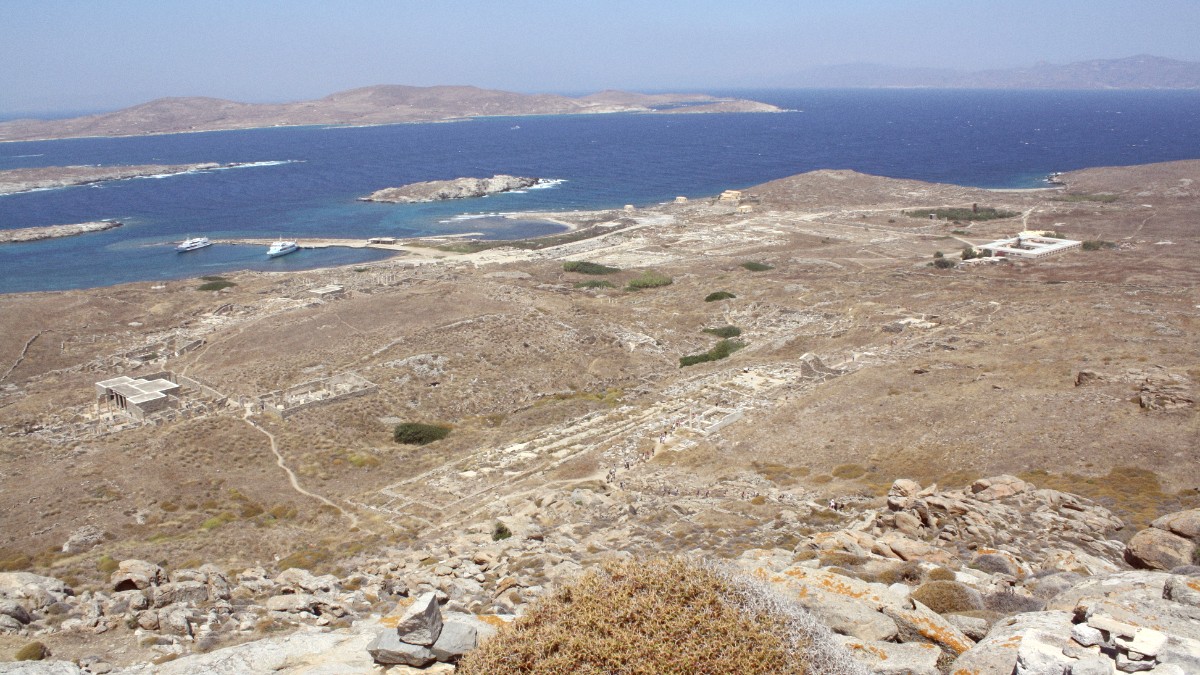
Greece
Summer (June-August): Hottest and driest. Temperatures frequently go above 25-30°C (77-86°F). Precipitation is rare. Strong Meltemi winds sometimes occur, impacting ferry schedules and making outdoor exploration challenging due to dust and intense sun.
Spring (April-May): Mild and pleasant, 18-24°C (64-75°F). Less wind than summer. Occasional light rain, but generally dry and sunny. Wildflowers cover the island.
Autumn (September-October): Similar to spring, mild and pleasant, 20-26°C (68-79°F). Sea water stays warm. Wind levels are lower than high summer.
Winter (November-March): Coolest and wettest conditions, 10-15°C (50-59°F). Higher chance of rain and strong winds. The archaeological site may have reduced operating hours, and ferry services become infrequent.
Greece does not experience monsoons or hurricanes. Extreme heat may occur in July and August, calling for careful hydration and Sun protection. Strong northerly "Meltemi" winds are common in summer. These winds may create rough seas, leading to ferry delays or cancellations, and outdoor exploration might feel less comfortable. Always check weather forecasts, especially wind predictions, before planning your Delos trip.
Prepare your documents well in advance for smooth entry into Greece and your visit to Delos. Greece is part of the Schengen Area, impacting visa requirements for many travelers.
Schengen Visa: Citizens of non-EU/EEA/Swiss countries may need a Schengen visa for stays up to 90 days within any 180-day period. Apply at the embassy or consulate of your main destination country. If you visit multiple Schengen countries for an equal duration, apply at the embassy or consulate of your first point of entry.
Visa-Exempt: Citizens from countries like the United States, Canada, Australia, the United Kingdom, and many others can enter Greece for tourism or business for up to 90 days without a visa. This exemption allows travel throughout the entire Schengen Area.
ETIAS (European Travel Information and Authorisation System): The European Union expects to implement ETIAS in 2025. Once effective, visa-exempt travelers will need to apply for an ETIAS authorization online before travel. This system is a pre-travel authorization, not a visa. Check the official EU website for updates on its implementation. Consider services like IVisa or VisaHQ for assistance.
Carry originals and copies
Valid for at least three months beyond your departure from the Schengen Area, issued within the last 10 years, with two blank pages.
Evidence of sufficient financial means and onward/return travel tickets may be requested.
Delos site has separate entrance fees
No specific entry fees at the Greek border. Standard immigration procedures at your first port of entry into the Schengen Area.
Access to the archaeological site and museum of Delos has a separate fee, typically €12 (subject to change). Concessions apply for EU citizens over 65, students, and children.
Observe local rules
No special permits are needed for visiting the archaeological site beyond the entrance ticket.
Camping or overnight stays on Delos are strictly prohibited for visitors. This rule preserves the delicate archaeological remains and maintains the site's protected status.
Greece uses the Euro (€). ATMs are widely available on Mykonos and other nearby islands. Currency exchange offices also operate, especially in tourist areas. It is advisable to exchange a small amount of cash before your arrival or withdraw funds from an ATM at the airport or upon arrival in Mykonos. Credit and debit cards are widely accepted for larger purchases at hotels, restaurants, and shops. The Delos archaeological site and museum accept card payments, but carrying small amounts of cash comes in handy for the cafe on the island or for small purchases on Mykonos where card machines might be less common for very small transactions.
Tipping is customary but not obligatory in Greece. For restaurants/cafes, round up the bill or leave 5-10% for good service. For small bills, rounding up to the nearest Euro is common and appreciated. For taxis, round up the fare to the nearest Euro. For tour guides, a tip of €5 - €10 per person for a good tour is a common practice. For hotel staff, a tip of €1 - €2 for bellhops or housekeeping for helpful service is appropriate.
€20 - €25
€12
€30 - €60 (in addition to ferry and entry)
€60 - €120 per day (hostel dorm, street food, bus)
€180 - €425+ per day (mid-range hotel, tavernas, occasional taxi)
Take time to prepare for common concerns and gather local resources.
No specific vaccinations are mandatory for entry to Greece for most travelers. Routine vaccinations are advised. Consult your doctor at least 4-6 weeks before your trip to verify all your routine vaccinations are current.
Dial 112 for the European emergency number (police, fire, ambulance). Mykonos has a public health center and several private clinics. Delos has no medical facilities; emergencies require evacuation by boat to Mykonos. Pharmacies are widely available on Mykonos, with many pharmacists speaking English.
Local bus tickets range from €1.80 - €2.50 per ride. A short taxi ride costs €10 - €20. Scooter rental (daily) is €25 - €45. Car rental (daily) is €40 - €100+.